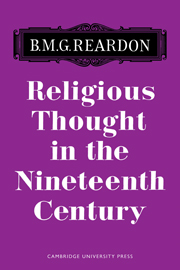Book contents
- Frontmatter
- Preface
- Contents
- Introduction
- PART I EUROPEAN
- PART II BRITISH AND AMERICAN
- 1 Coleridge
- 2 F. D. Maurice
- 3 Newman
- 4 Mansel
- 5 J. S.Mill
- 6 Benjamin Jowett and Essays and Reviews
- 7 Matthew Arnold
- 8 Scott Holland and Lux Mundi
- 9 The British Hegelians
- 10 Emerson
- 11 Josiah Royce
- 12 William James
- Index of Works Cited
6 - Benjamin Jowett and Essays and Reviews
Published online by Cambridge University Press: 12 March 2010
- Frontmatter
- Preface
- Contents
- Introduction
- PART I EUROPEAN
- PART II BRITISH AND AMERICAN
- 1 Coleridge
- 2 F. D. Maurice
- 3 Newman
- 4 Mansel
- 5 J. S.Mill
- 6 Benjamin Jowett and Essays and Reviews
- 7 Matthew Arnold
- 8 Scott Holland and Lux Mundi
- 9 The British Hegelians
- 10 Emerson
- 11 Josiah Royce
- 12 William James
- Index of Works Cited
Summary
The most sensational theological event in England in the mid-nineteenth century—apart from the appearance a year earlier of Darwin's epoch-making treatise in the realm of biology—was the publication in i860 of Essays and Reviews. The studiously non-committal title of the volume belied the nature of its contents. To us today these seem harmless enough, but at the time— and the Darwinian controversy was already inflaming partisan feeling—its effect in ecclesiastical circles—far more representative of the general opinion than now—was explosive. It was the joint effort of seven friends, mostly Oxford men and all of them liberal churchmen, who included Frederick Temple, headmaster of Rugby and subsequently Archbishop of Canterbury, Rowland Williams, fellow of King's College, Cambridge, Mark Pattison, tutor, afterwards Rector, of Lincoln College, Oxford, and Benjamin Jowett, professor of Greek in the same university. Their confessed aim was to promote the free discussion of controversial subjects in theology; such in fact as were ‘particularly liable’, in the writers' judgement, ‘to suffer by the repetition of conventional language, and from traditional methods of treatment’. Reticence in these matters, they felt, could do no good and would in the end prove mischievous. Jowett was especially outspoken. ‘We do not wish’, he wrote to a friend, ‘to do anything rash or irritating to the public or the University, but we are determined not to submit to this abominable system of terrorism, which prevents the statement of the plainest facts, and makes true theology or theological education impossible.’ That the reception likely to be accorded to their views would be hostile they could hardly therefore have doubted.
- Type
- Chapter
- Information
- Religious Thought in the Nineteenth Century , pp. 309 - 323Publisher: Cambridge University PressPrint publication year: 1966

